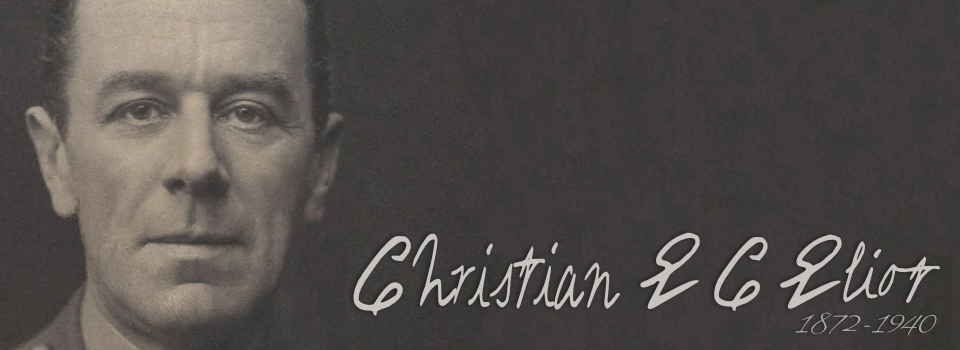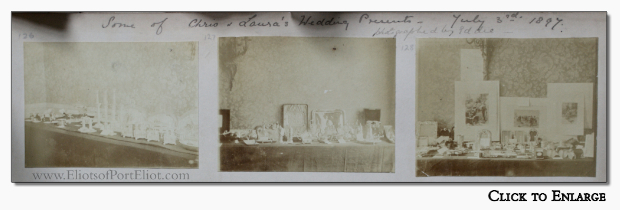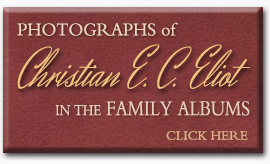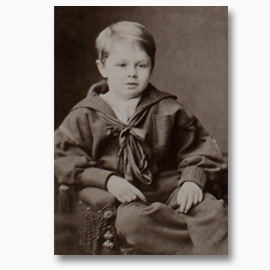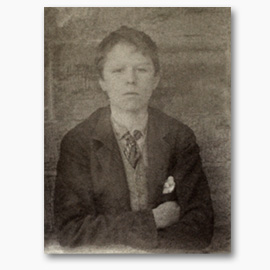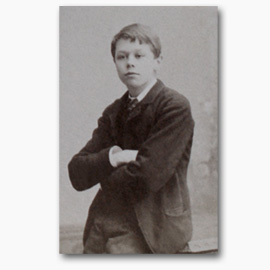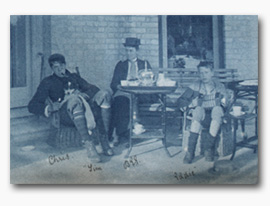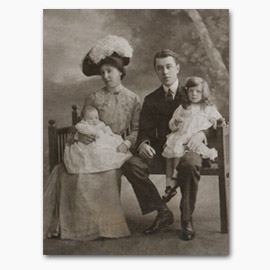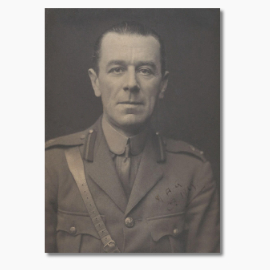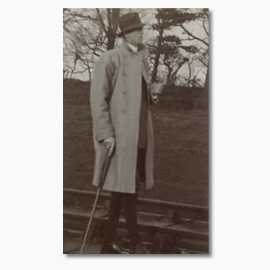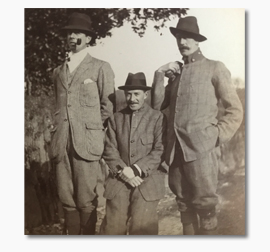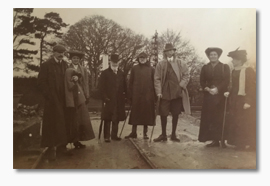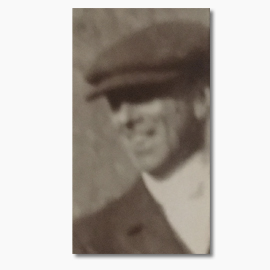Christian Edward Cornwallis Eliot (1872 - 1940)
Christian was the fifth child and third son of Charles Eliot and Constance Guest, known to family and friends as Chrissie or Chris.
Christian spent his early years between the family house in London and his grandfather's house in Cornwall (Port Eliot), where his parents lived much of the year during his childhood. Scads of photos survive in family albums, showing the Eliots together with their pet dogs and afternoon teas on the terrace, visiting friends, hunting parties, etc. Chrissie, pipe in mouth, is a common figure in these early home photos (many of them taken by his siblings). Unlike his siblings, Chris seems to have had no aptitude for all things musical. In true Eliot style, though, he was considered quite good on the dance floor and in front of the footlights in the many amateur theatricals staged by family and friends. At thirteen, he followed in his older brothers' footsteps and attended Charterhouse School in Surrey. There followed training as a Civil Engineer before he finally became a practicing architect (specialising in interior design) with the firm of Allen & Mannooch in Mount Street, London.
At the age of 25, in 1897, Chris married the well-connected Laura Chetwode in a lavish London wedding at St. Peter's Church, Eaton-square. The wedding party comprised ten bridesmaids in pink dresses (all wearing the bridegroom's gift of a green enamelled heart brooch with diamond center). The gifts numbered more than 400 and were displayed at the home of the bride's parents, where Chris' younger brother, Eddie Eliot, snapped a quick photograph discovered in a family album. After a honeymoon tour in Scotland, the couple returned to England, dividing their time between their home in London and her family home in Shropshire. Chris and Laura had three children (two daughters and a son) before the dissolution of their relationship; by about 1910 the couple were permanently estranged and living apart.
There are no known examples of Chris' architectural or design work, as most (if not all) of the houses he worked on have been demolished or completely remodeled. He worked on such places as Byrkley Lodge (Staffordshire), Cheswardine Hall (near Stoke on Trent), Kenmure Castle (Galloway) and his aunt's house at 3 Savile Row. When Allen & Mannooch closed in 1912, the new firm of Christian Eliot, Ltd., was incorporated in offices on Cadogan Place. The first newspaper ads appeared in March of that same year, announcing the firm's specialty of Interior Design, and they became well known for their "charming" hair carpets, "available in at least fourteen different shades". Business appears to have been quite good until the onset of the first World War, when Chris found himself immersed in war work. (He delayed closing his architectural company until September 1916 and didn't officially dissolve it until 1932.)
At the beginning of WWI, Christian Eliot joined the Royal Naval Volunteer Reserve as a Lieutenant and was posted to the newly established Anti-Aircraft Defence Corps (who were responsible for protecting London from the new threat of airplane and zeppelin attack). On 20 Oct 1916, Chris joined MI5 as head of the newly formed Military Permit Office (MPO) in London. This Office was part of the Staff of the Director of Naval Intelligence and spent its early years lodged aboard the HMS President before a move to land offices in London.
Chris had apparently inherited the renowned tact and diplomacy of his father, making him a natural for this senior position in an MI5 operation. This was no spy-detecting role. The MPO issued permits allowing citizens to visit places around the world which were controlled by the British Army (e.g., France). These special permits were issued in addition to the regular visas issued by the actual government of the foreign areas. Essentially, these MPO permits were designed to stop anyone from entering the areas without military purpose (i.e., journalists, businessmen, potential enemy spies). As can be imagined, the position held by Chris required a great deal of patience. And authority. And tact. Many of the applicants felt they were . . . let's say, "important" enough to bypass the regular channels, requiring a certain amount of special handling. After the war, with the amount of British citizens (many of them of high standing) who often became indignant at the idea of being restricted in their travel, it seems to have become necessary to raise Chris to a place of higher rank and authority, in order to enable him to "persuade" these people to play by the rules. In 1919, Lieut. Christian Eliot was granted the honorary rank of Lieutenant Colonel in the Royal Marines and awarded an OBE.
One of the main concerns at the MPO was the authorization of travel for wives and families of soldiers serving in the occupied Rhineland. Though the restrictions in France were lifted gradually, British subjects still needed approval to travel to Paris for any reason, as well as occupied Germany, Russia, Turkey, Egypt and other places. While passports were not required for a fallen soldier's relative to visit a battlefield (though they could visit no other areas or stay longer than ten days), special permits were required for these graveside visits in both France and Belgium. Despite widespread notices (published in newspapers across the country) reminding people that travel documents must be obtained in good time, delays were common – mostly due to the sheer volume of permit requests. Each employee in Chris' department was processing between 80 and 100 applications for permits per day, causing Chris to put a sign on the office door: "Please don't knock on the door. It frightens us and doesn't get you to France any sooner." (What we now recognize as adrenal fatigue was unknown in those days. A photo taken at the time shows a thin and exhausted man who looked much older than his 47 years.)
The MPO was "abolished" in 1922, but the work continued under the auspices of the Passport Office of the Foreign Office. Chris was appointed to the Reserve Officers for Intelligence Duties, remaining in this position until about 1927, when travel restrictions for France were no longer necessary. During the years of 1922-1927, although officially then a member of the Foreign Office staff, he still received a small salary (£26 per annum) from MI5. By the 1930s, Chris was retired from military work and listed as the "past director" of the British Passport Service. The few news reports that have surfaced mention "Col. Chris Eliot" among the guests at Toby's, an elite London club owned by Tallulah Bankhead and featuring the new indoor amusement of "Midget Golf", but he doesn't appear to have played a large part in London's society news after his retirement.
17 days after the death of his estranged wife, Laura, in 1938, Chris married his long-time mistress, Daisy Blossom Roberts (nee Elkan). They now lived as man and wife in their London flat and their Sussex home, Thatched Hut on Redbridge-lane in Crowborough, for a little more than two years, before Chris was diagnosed with Colon Cancer. He passed away in October of 1940, and his remains were taken back to Port Eliot and buried (with his parents) in the family vault at St. Germans. A simple memorial plaque hangs in St. German's Church in memory of Chris and his second wife. He had little or no relationship with his children by his first wife, and he and Daisy had no children together. Chris is best remembered as seen in the old family albums, a young man with a deerstalker hat on his head, a pipe in his mouth and those long, lanky legs stuck out in front of him in that most careless manner of his. In the golden days of youth. Rest in peace, Chrissie.

— "1891 England Census Record" (London, Kensington, Brompton, District 8, 7) :
Christian E.C. Eliot - Son - S - 18 - Civil Engineer Student - Brompton, London
— "Gentlewoman" 27 Mar 1897, page 23:
At Prince's Mr. Algy Grosvenor displays great skill, and a good many ladies are almost equally clever, notably Lady Beatrix Taylour, Lady Coke, Mrs. Creyke and her daughter, besides little Miss Irby, whose performance is wonderful for so youthful a person. Lord Streadfort and Mr. Christian Eliot are amongst the energetic of the male skaters . . .
— "London Daily News" 5 May 1903, page 9:
A BOGUS BURGLARY.
Before Mr. Horace Smith at Westminster yesterday, Henry Southan, 30, a butler, was charged with robbing his late employer, Mr. Christian Eliot, of 114, Sloane-street, Chelsea. Detective-Sergeant Williams said that the prisoner, in the prosecutor's absence from town, made out that there had been a burglary at his house. To give colour to this a pantry safe was broken open and a quantity of silver was left in a bag ready for removal. The police had some suspicion about the affair, and on the 25th ult. the prisoner absconded from the house. When arrested he said that he had sold his master's clothes and race glasses. He also admitted that he had drunk Mr. Eliot's wines and spirits, and made away with other property. Remanded.
— "London Daily News" 27 May 1903, page 9:
BASE INGRATITUDE.
Henry Southan, 30, butler, pleaded guilty at the County of London Sessions, Clerkenwell, yesterday, to having stolen four suits of clothes and other property, worth 20 pounds, belonging to Christian Eliot, an architect, of Sloane-street.
In 1900 the prisoner was sentenced to 12 months' imprisonment for several larcenies committed by him wilst empoyed as a valet at a Knightsbridge hotel. After his release the prosecutor, knowing of his past career, took compassion upon him, and employed him as a butler. Southan, however, betrayed the confidence and stole many articles, the absence of which he accounted for by inventing a bogus burglary story. Finally he absconded with other property. Sentence of 21 months' hard labour was passed.
— An Entry from Lady Enid Layard's Journal(now part of the Armstrong Browning Library of Baylor University):
[Lady Layard was the sister of Chrissie's mother, Constance Eliot.]
14 January 1904 – Canford Manor, near Wimborne, Dorset
Thursday. I left Canford and returned to 3 Savile Row. I employed Chrissie Eliot, now head of the firm of Allen & Mansveh in Mount St, to do work in this house. He has built me a passage leading out of the dining room over the yard to the studio. I asked him also to put a bath into my dressing room. He said this could quite well be done, and he asked to see the place of the drains in order to make the necessary arrangements, but was sure it would be all right. However, on applying the test he found everything much the contrary, and we came to the conclusion that they must immediately be put in order. Monty had had all done 17 years ago, and they had not been looked at since and were leaking. There is no help for it, and Chrissie said if I would turn out of the house in a week he would undertake to get the work done within 5 weeks, so that I might still let the house for the season to the young Ivor Guests. It was decided that the Wylds and I should get into their new house 27 Lower Seymour St where, happily, they had begun to prepare for themselves . . .
— "Royal Cornwall Gazette" 24 Jan 1907, page 4:
According to the 'Court Journal,' Lord and Lady St. Germans have recently had a very successful fancy dress ball at Port Eliot. Nearly 200 guests were present, and the scene in the famous Round Room when dancing was in full swing was very beautiful, the dresses being very handsome, and showing a rich profusion of colours. Music was supplied by the band of the Royal Garrison Artillery from Plymouth, and dancing, which bagan soon after ten o'clock, was kept up with spirit until the early hours of the following morning. Supper was served in the dining-room, and the decorations of the ball-room were of a most artistic and effective kind. A cotillon was arranged with great success by Lady Mary Dawson and Mr. Christian Eliot. For the ball Lord and Lady St. Germans had a large house-party at Port Eliot.
— "The London Gazette" 1 Dec 1914, page 10186:
Temporary Commisions in the Royal Naval Volunteer Reserve have been issued as follows:
Lieutenant. Christian E.C. Eliot
— "Yorkshire Post and Leeds Intelligencer" 08 Feb 1919, page 9:
The following appointments, etc., appeared in the 'London Gazette' last night:–
Royal Marines.– To be Temp. Hon. Lt-Col. on the Unattached List for duty on Staff of the Director of Naval Intelligence, – C.E.C. Eliot (from temp. lt., R.N.V.R.).
— "The Carthusian" February 1920, page 384-5:
War List.
Honours and Rewards.
Dated 5th May, 1919.
In recognition of services rendered in the field.
O.B.E. (Military Division)
Temp. Hon. Lieut.-Col. C.E.C. Eliot
— "Supplement to the London Gazette" 7 Feb 1921, page 1038:
Decorations Conferred by His Majesty the King of the Belgians.
'Officier' (Award)
Temporary (Honorary) Lieutenant-Colonel Christian E. C. Eliot, O.B.E., Unattached List, Royal Marines.
— "The London Gazette" 24 Oct 1922, page 7462:
Regular Army Reserve of Officers.
Intelligence. - Lt.-Col. C.E.C. Eliot, O.B.E., late R. Mar., to be Lt.-Col., 15th Sept. 1922, with seniority 8th May 1919.
— "Western Morning News" 27 Oct 1922, page 4:
Lt.-Col. C.E.C. Eliot, late Royal Marines, is appointed to the Reserve of Officers for intelligence duties.
— "The London Gazette" 19 July 1927, page 4647:
Regular Army Reserve of Officers. The undermentioned having attained the age limit of liability to recall, cease to belong to the Res. of Off.:–
Intelligence. Lt.-Col. C.E.C. Eliot, O.B.E.
17th July 1927
— "Derbyshire Times and Chesterfield Herald" 4 Feb 1928, page 8:
CHRISTENING AT ALDERWASLEY HALL.
The christening of the infant son of Major F.C.A. Hurt and Mrs. Hurt, of Alderwasley Hall, took place on Thursday in the Alderwasley private chapel. The service was taken by the Rev. Canon J.W. Kewley, late vicar of Matlock. The Godparents were Mrs. Kearns, Lieut.-Col. the Hon. Christian Eliot, and Capt. George C.H. Davy. The name of the child is Christian George Francis Hurt. Only the Godparents and a few intimate friends were present at the ceremony.
— "Sevenoaks Chronicle and Kentish Advertiser" 15 Dec 1939, page 16:
£1 REWARD. Lost, near Crowborough, December 2, Black Labrador Dog, aged 18 months. Address on round leather collar, Thatched Hut, Crowborough. Long cord attached to collar. Answers to name of Tim. -- Address Lt.-Col. Honble. C. Eliot, Thatched Hut, Redbridge Lane, Crowborough, Sussex. Telephone 252 Crowborough.
— "Western Morning News" 22 Oct 1940, page 3:
WEST PEER BEREAVED
Death of Lieut.-Col. The Hon. Christian Eliot
The death is announced of Lieut.-Col. the Hon. Christian Eliot, at his home, near Crowborough, on Sunday night. He is a brother of the Earl of St. Germans and the Hon. Sir M.C. Eliot, and a son of the late Hon. Col. C.G.C. Eliot.
Lieut.-Col. the Hon. Christian Eliot, who was 68, served in the Royal Marines, and was in the Intellignece Department in the last war. He was an assistant air-raid warden for Crowborough district. He was married and leaves a widow and family.
The funeral takes place at St. Germans Parish Church on Thursday.
— "Western Morning News" 23 Oct 1940, page 6:
Lt.-Col. Hon. C. Eliot's Funeral
The funeral of Lieut.-Col. the Hon. Christian Eliot, a brother of the Earl of St. Germans and the Hon. Sir M.C. Eliot, will be at St. Germans Parish Church tomorrow at three.
— "Sevenoaks Chronicle and Kentish Advertiser" 01 November 1940, page 4:
The interment took place in the family vault at St. German's Church, Port Eliot, Cornwall, on Thursday week of Lt.-Col. the Hon. Christian Edward Cornwallis Eliot, who died at the Thatched Hut, Redbridge Lane, Crowborough, the previous Sunday. Born in 1872, he was a son of the late Colonel the Hon. Charles George Cornwallis Eliot, and grandson of the third Earl of St. Germans. The Rev. W. Gill officiated, and the morners included the Hon. Mrs. Christian Eliot, the Hon. Sir Montague and Lady Eliot, Mrs. James, Colonel Lord Vivian and Surgeon-Rear-Admiral E. A. Penfold.
— "Western Morning News" Friday, 25 Oct 1940, page 4:
Lieut.-Col. Hon. C. Eliot at St. Germans. Funeral Largely Attended. The funeral of Lieut.-Col. the Hon. C. Eliot took place at St. Germans yesterday, the interment being in the family vault in the churchyard. Rev. W. Gill (vicar) conducted the service, and the surpliced choir led the singing of the hymns "Hark, hark my soul", and "Lead Kindly light". Mourners were the widow; the Hon. Sir M.C. Eliot, brother; Lady Eliot, sister-in-law; and Mrs. E. James, niece. Bearers were Messrs. W.J. Bersev, G.E. Hatton, D.W. Lang, F.A. Trevethan, J. Hastie, and A. Trenouth, employees on the St. Germans estates. Among those present were Col. Lord Vivian (Glynn), Adml. A.E. Penfold, Messrs W. Tamblyn, H. Bond, T. French, W.G. Broad, J. Haddy, J.H. Goard, L.M. Goard, W. May, L. Laundry, W.H. Stephens, G. Rapson, A. Salmon, T. Eastment, H. Cardew, and K. Trezise. Mr. and Mrs. F. Lyde Caunter (Liskeard), Mesdames L. Laundry, J.H. Goard, P. Crapp, R. Richards, G. Locke, F. Trevethan, W.H. Stephens, J.W. Warren (representing Col. J.W. Gil), G.R. Harman, W.H. Sprague, I. Stringer, D. Lang, R. Geary, and G. and Misses C. Laundry.)
— "England & Wales, National Probate Calendar, 1861-1941":
Eliot, the honourable Christian Edward Cornwallis of The Thatched Hut Redbridge-lane, Crowborough, Sussex, died 20 October 1940. Probate Llandudno 25 February to Philip Brian Marrtineau solicitor and Daisy Blossom Eliot widow. Effects 511 pounds 7s. 6d.
